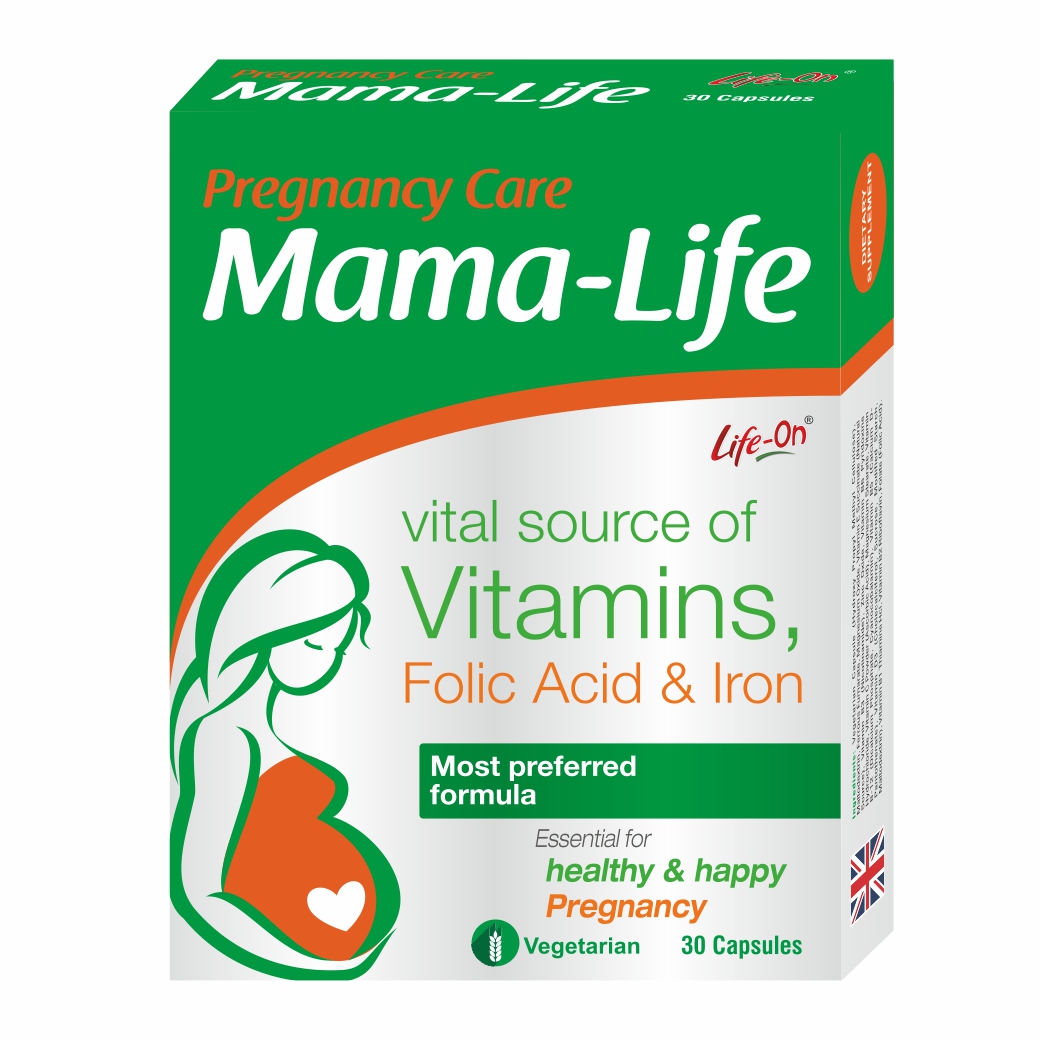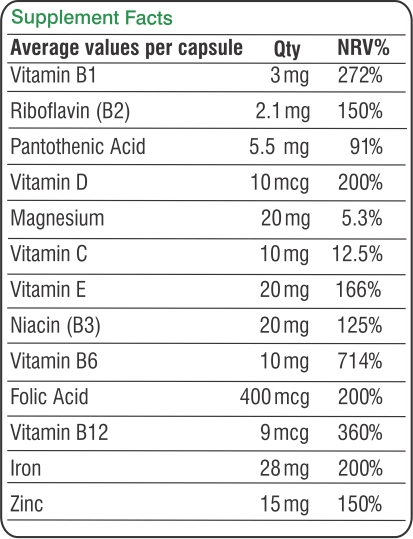

Product Information
Life On Mama-Life is a vitamin and mineral supplement specially formulated for use in women at least 2-3 months prior to conception, throughout pregnancy and during the postnatal period.
A prenatal Vitamin is a supplement designed to be taken before, during and after pregnancy to ensure you are getting the proper amounts of Vitamins and Minerals necessary for the health of you and your baby. During pregnancy, the mother's body is depleted of its regular supply of Vitamins and Minerals, so a prenatal Vitamin will protect the health of both the mother and her developing child.
Pregnancy or gestation period is the term used to describe the period in which a woman carries a fetus inside of her uterus. Pregnancy usually lasts about 40 weeks or just over 9 months (prenatal period), as measured from the last menstrual period to childbirth (1).
Regular prenatal care improves the chances of a healthy pregnancy which provides healthy birth of a child. During pregnancy, the mother's body is depleted of its regular supply of Vitamins and Minerals, so prenatal Vitamins and Minerals will protect the health of both mother and her developing child (eg: Folic Acid 400 mcg) (2).
Some women experience health problems during pregnancy. These complications can involve the mother's health, the fetus or both. These complications make a high-risk pregnancy. Complications of pregnancy, which are not as common are eg: Iron-deficiency anemia. Pregnant women need more iron than normal for the increased amount of blood they produce during pregnancy iron deficiency symptoms include feeling tired or faint, experiencing shortness of breath and becoming pale. The ACOG recommends 27 milligrams of iron daily (1).
In terms of maternal health, clinical Vitamin B12 deficiency may be a cause of infertility or recurrent spontaneous abortion (3) Vitamin B6 deficiency causes nausea and vomiting often referred as morning sickness, it can effect 85% of women during pregnancy and usually lasts between 12 to 16 weeks (4).
Vitamin D deficiency is thought to be common among pregnant women, particularly during the winter months and has been found to be associated with an increased risk of pre-eclampsia, gestational diabetes mellitus, preterm birth and other tissue-specific conditions (5). 10 micrograms of Vitamin D each day throughout your pregnancy you should also carry on taking this after your baby is born if you breastfeed (7). Maternal magnesium deficiency has been associated with premature labour and has also been implicated in the pathogenesis of sudden infant death syndrome(SIDS) (8).
Life On Mama-Life unique formulation contains a perfect blend of essential nutrients like Elemental Iron, Vitamin B, Vitamin C, Vitamin D, Vitamin E. For women during preconception and the 9 months of pregnancy who are depleting Iron levels and Vitamins are compensated by our Life On Pregnancy Care Mama-Life. Iron and Vitamin C have a symbiotic relationship with one another aid in Iron absorption. Vitamin C helps the body absorb Folic Acid and create Proteins in the body. Effectively achieves and maintains Haemoglobin levels.
Life On Pregnancy Care Mama-Life benefits:
Iron Contributes in treating iron deficiency anemia (1), low daily dose of Iron may improve birth weight even in non-anemic pregnant women (6).
Vitamin C is essential for tissue repair, wound healing, bone growth and repair, and healthy skin. Vitamin C also helps your body fight infection and it acts as an Antioxidant, protecting cells from damage (9).
Magnesium is an essential mineral required for the regulation of body temperature, Nucleic Acid and Protein synthesis and in maintaining nerve and muscle cell electrical potentials (10).
Zinc is an essential mineral known to be important for many biological functions including protein synthesis, cellular division and nucleic acid metabolism (11).
Vitamin D regulates the amount of calcium and phosphate in the body, which are needed to keep bones and teeth healthy. Children, not having enough Vitamin D can cause their bones to soften and can lead to rickets (7).
References
1."Pregnancy: Condition Information". http://www.nichd.nih.gov/. December 19, 2013. Retrieved 14 March 2015.
2."What is prenatal care and why is it important?".http://www.nichd.nih.gov/. July 12, 2013. Retrieved14 March 2015
3.Food Nutr Bull. 2008 Jun;29(2 Suppl):S101-11; discussion S112-5.
4.lpi.oregonstate.edu/mic/vitamins/vitamin-B6
5.http://www.who.int/nutrition/publications/micronutrients/guidelines /vit_d_supp_pregnant_women/en/
6.Appl Physiol Nutr Metab. 2007 Apr;32(2):282-8.
7.www.nhs.uk/conditions/pregnancy-and-baby/pages/vitamins-minerals-supplements-pregnant.aspx#close
8.lpi.oregonstate.edu/mic/life-stages/pregnancy-lactation
9.http://www.babycenter.com/0_vitamin-c-in-your-pregnancy-diet_660.bc
10.Magnesium supplementation in pregnancy Cochrane Database Syst Rev. 2014 Apr 3;4: CD000937.
11.http://www.who.int/elena/bbc/zinc_pregnancy/en/
